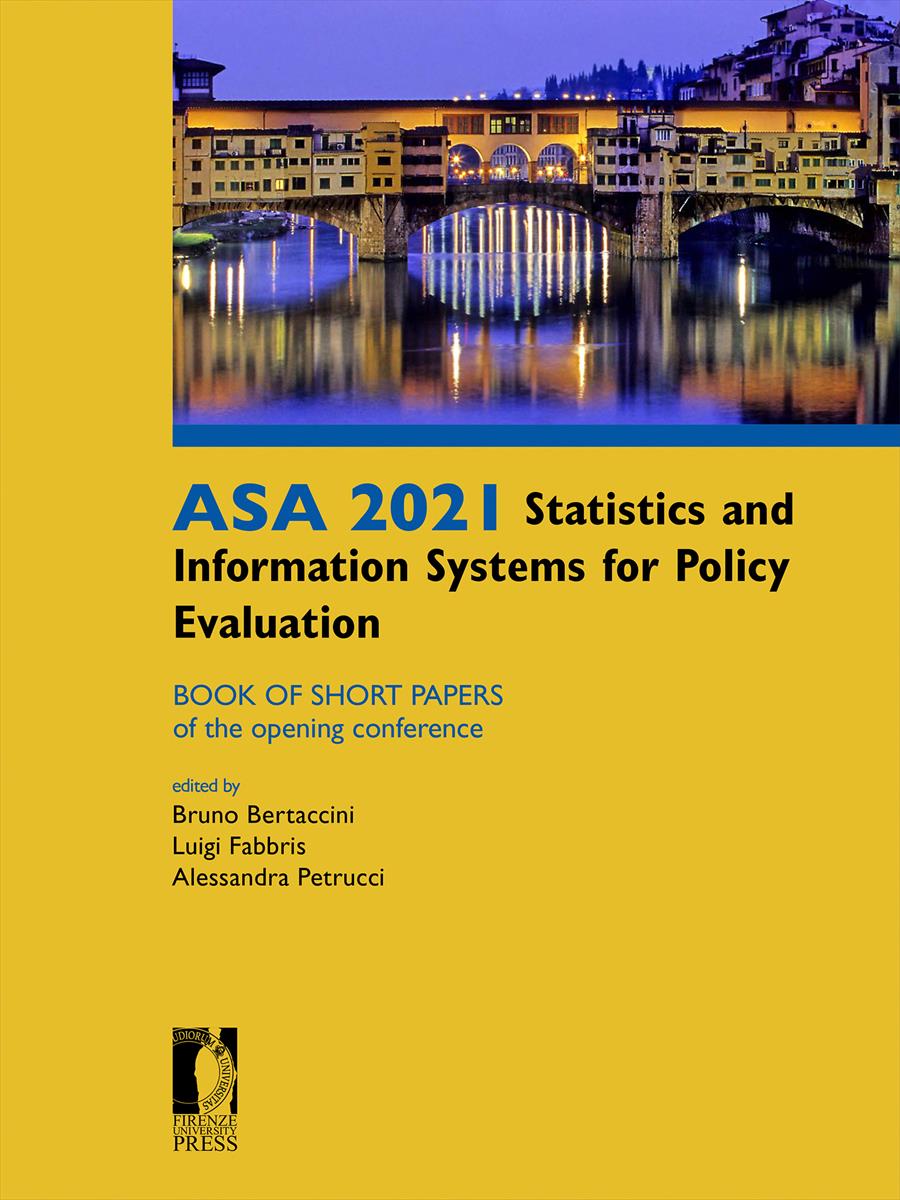- ASA 2021 Statistics and Information Systems for Policy Evaluation
- Edited by Bruno Bertaccini, Luigi Fabbris, Alessandra Petrucci
A quantitative study to measure the family impact of e-learning
- Cristina Davino
- Marco Gherghi
- Domenico Vistocco
- © 2021 Author(s) |
- CC BY 4.0
- DOI: 10.36253/978-88-5518-304-8.21
The Covid emergency has forced universities around the world to transfer teaching activities online. Even if online teaching has made it possible to carry out the planned teaching activities, it is necessary, in retrospect, to evaluate the impact that this teaching method has had on the different types of students, in terms of preparation, characteristics and social background. In this framework, the presents paper aims to evaluate if distance learning can be considered socially less useful because it increases the divide between the advantaged and disadvantaged students. The study is based on the analysis of data collected at the University of Naples Federico II in June 2020. More than 19 thousand students took part in the survey, carried out to monitor distance learning activities. The aim of this work is to analyse whether and how much the distance learning activities has had an impact on the students' families both in terms of the organisation of the spaces and daily rhythms and from an economic point of view, having required additional expenses. This objective will be achieved through the use of a factorial method that will provide a composite indicator measuring the family impact of distance learning. We will then try to explain if the family impact takes different forms and intensity depending on the students' characteristics, the availability of computer equipment and the type of teaching used. Quantile regression will allow to differentiate the study of effects for different levels of family impact. Finally, it will also be evaluated whether the experience lived in terms of the family impact of the distance learning, conditions the judgement on the preferred teaching method for the future, totally online, oriented towards a complete return to face-to-face teaching or a mixed solution that takes advantage of the experience lived.
- Keywords:
- Online learning,
- Quantile regression,
- Composite indicators,
University of Naples Federico II, Italy - ORCID: 0000-0003-1154-4209
University of Naples Federico II, Italy - ORCID: 0000-0003-0363-145X
University of Naples Federico II, Italy - ORCID: 0000-0002-8541-6755
- Davino, C., Furno, M., Vistocco, D. (2013). Quantile Regression: Theory and Applications. Wiley, Chichester, UK.
- Di Pietro, G., Biagi, F., Costa, P., Karpiski Z., Mazza, J. (2020). The likely impact of COVID-19 on education: Reflections based on the existing literature and international datasets. EUR 30275 EN, Publications Office of the European Union, Luxembourg.
- Freudenberg, M., (2003). Composite Indicators of Country Performance: A Critical Assess- ment. OECD Science, Technology and Industry Working Papers 2003/16, OECD Publishing.
- Koenker R., Basset G.W. (1978). Regression Quantiles. Econometrica, 46, pp. 33–50.
- Lebart, L., Morineau, A., Piron, M. (2000). Statistique Exploratoire Multidimensionnelle. Dunod, Malakoff Cedex, FR, pp. 181–184.
Chapter Information
Chapter Title
A quantitative study to measure the family impact of e-learning
Authors
Cristina Davino, Marco Gherghi, Domenico Vistocco
Language
English
DOI
10.36253/978-88-5518-304-8.21
Peer Reviewed
Publication Year
2021
Copyright Information
© 2021 Author(s)
Content License
Metadata License
Bibliographic Information
Book Title
ASA 2021 Statistics and Information Systems for Policy Evaluation
Book Subtitle
Book of short papers of the opening conference
Editors
Bruno Bertaccini, Luigi Fabbris, Alessandra Petrucci
Peer Reviewed
Publication Year
2021
Copyright Information
© 2021 Author(s)
Content License
Metadata License
Publisher Name
Firenze University Press
DOI
10.36253/978-88-5518-304-8
eISBN (pdf)
978-88-5518-304-8
eISBN (xml)
978-88-5518-305-5
Series Title
Proceedings e report
Series ISSN
2704-601X
Series E-ISSN
2704-5846
